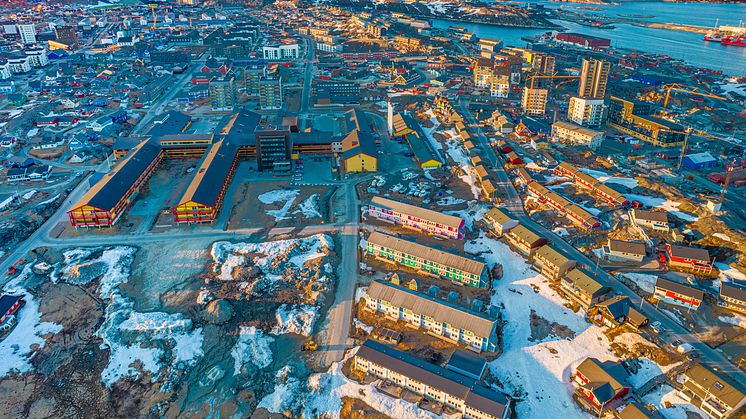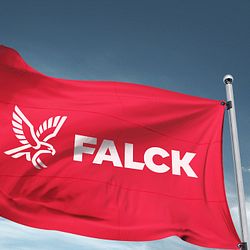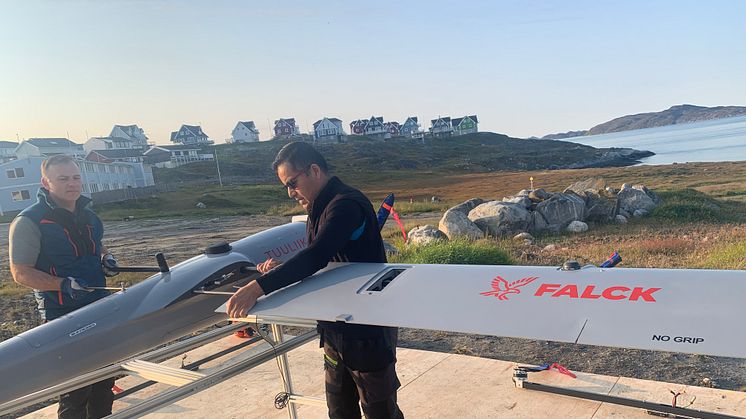
Press release -
Falck starts flying drones in Greenland
In the period until November 2022, Falck and the Greenlandic health service will test the use of drones to transport medicine and diagnostic samples between towns and settlements. The intention of the project is to investigate how drones can strengthen health efforts in the settlements, where infrastructure is a challenge, and the nearest hospital is far away.
In collaboration with the Agency for Health and Prevention (Greenland's Self-Government) and the Greenland Center for Health Research, Falck takes another important step towards the integration of drones in the health field. Drones will help to connect the settlements closer to the hospital, and the residents of the Greenlandic region Sermersooq will be the first in Greenland to test the use of drones in the health service.
Falck has worked with implementation of drones in the healthcare system for several years, and through close collaboration with the healthcare system Falck has solid experience in establishing logistics processes that fit with the surrounding organisation. Together with the Greenlandic health authorities who know the existing organisation and the needs of the citizens, the partners will jointly develop a set-up that supports the integration of drones in the healthcare system.
"We are excited to find out how drones can contribute to our healthcare system and help citizens who live far from the nearest hospital. We are currently working on ensuring a set-up that works well with the workflows and processes that our healthcare system is built around today,” says Ella Skifte, head nurse in the Greenland health service.
The drones will transport medicines such as antibiotics and diagnostic samples from Dronning Ingrid’s Hospital in Nuuk to the settlements Kapisillit and Qeqertarsuatsiaat. As the distances between the settlements and the nearest hospital are long, the use of drones will help to ensure a faster diagnosis and make it easier and faster to get vital medicine across long distances.
“We are incredibly pleased with the collaboration with the Greenlandic health service and their foresight, so that we can now seriously test how health drones work in practice over long distances and in interaction with the existing health service. These are crucial experiences we are making now, and they will form the foundation on which our further implementation of drones in the healthcare system will be built,” says Nicolai Søndergaard Laugesen, development director and head of drone projects at Falck.
The importance of fast diagnosis
Chief regional doctor in Region Sermersoog, Jesper Olesen also hopes that drones may help with both faster diagnosis and delivery of medicine.
“A faster course of treatment is ultimately of great importance in more serious cases of illness. So, I look forward to seeing how drones can contribute to reducing the experience of distances in our region and hopefully help to raise our health,” says Jesper Olesen.
Waiting time due to the long distances is both costly and can in some cases be absolutely crucial for a patient's treatment. Therefore, in the long term, the drone project is expected to contribute to a more efficient patient care with the possibility of faster responses to examination results and thus faster initiation of treatment.
“Greenland's geography and settlement pattern pose special conditions and challenges when it comes to citizens' access to health services. At the Greenland Center for Health Research, we look forward to gathering knowledge from the project, which can help strengthen health efforts between settlements and cities,” says regional doctor and chairman of the Greenland Center for Health Research, Gert Mulvad.
The project is anchored with the chief regional doctor Jesper Olesen in Region Sermersooq and Falck's development unit Vertical which for several years has worked with the implementation and use of drones in the healthcare system.
Categories
About Falck
For more than a century, Falck has worked with local and national governments to prevent accidents, diseases and emergency situations, to rescue and assist people in emergencies quickly and competently and to rehabilitate people after illness or injury. This has made Falck an international leader in emergency response and healthcare services.
Falck operates in 26 countries and has approximately 29,000 employees.
.


